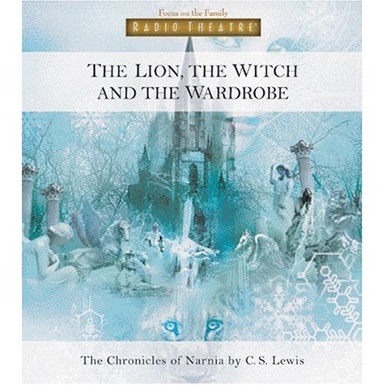‘Narnia’ In The Mind’s Theatre
Another film adaptation from C.S. Lewis’s classic The Chronicles of Narnia series, may be further in the future. But since 1999, listeners have enjoyed Focus on the Family Radio Theatre’s audio-drama adaptations, which cover all seven books in the series.
With only a few exceptions — Caspian dialogue glitches and an occasionally overacting Aslan — the audio dramas are an imaginative and enchanting way to experience the stories of Narnia. (This review was first published on LibraryThing. Also note that these reviews are in order of the dramas’ release dates, which differs from both the supposed “chronological order” and originally published order of The Chronicles of Narnia books.)
The Lion, the Witch
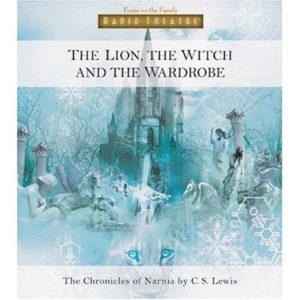 After hearing about it for years, I have finally started the Focus on the Family Radio Theatre dramatization of The Chronicles of Narnia.
After hearing about it for years, I have finally started the Focus on the Family Radio Theatre dramatization of The Chronicles of Narnia.
The Narnia books have been favorites of mine since childhood, but I had never listened to them on audiobook. Due to a recent move, I now have a long drive to work … but I was amazed how quickly it went when I started listening to The Lion, the Witch and the Wardrobe! (I was almost tricked into putting in the first disc — The Magician’s Nephew — but I noticed in time, and quickly substituted the proper first book of the series *wink wink*.)
I was completely enthralled by the dramatization. The script is excellent, so wonderfully faithful to the book. I love how they used most of the book’s dialogue, and the parts they added or modified slightly because of the different medium were not disruptive in the least. This is my first radio dramatization, so I don’t know how their sound effects compare to those of other productions, but they sounded quite good to me. The music was fitting and did not compete with the narration.
The talent they gathered for this production is also, for the most part, stellar. It took me a few minutes to get used to Paul Scofield’s narration, but once I got to know his voice I felt how well it fitted Narnia. The child actors are also quite good, with the actors voicing Lucy and Edmund standing out particularly to me. Peter sounds a little like he is reading lines with emphasis rather than really delivering them, but it’s only when he has a long speech to make, and isn’t too glaring.
The big exception to the general excellence of the voice actors is David Suchet’s Aslan. I had been warned that he overplayed the role, and unfortunately I have to add my voice to those who say, as politely as possible, “ouch!” He draws out the ends of his words in such an odd way; he sounds like a bad voice-over actor in a commercial. I like the growly-ness of his softer lines, but his loud ones are just comical rather than majestic. It’s really shocking that no one in the production found his portrayal as ridiculous as it comes across to the average listener. Someone should have told him to tone it down. It’s really a shame that the central Character in the stories should be so badly misplayed.
But besides that, I thoroughly enjoyed this audio drama. It is like watching a movie in your head. It was interesting to see what my brain conjured up as I listened. Mostly it was a combination of the better actors from both the BBC and Walden film adaptations of Narnia, and it was lovely to pull the best pieces together from each of those productions and leave the dross behind. I cannot recommend this dramatization enough: it’s faithful to Lewis’s brilliant original story, and for purists like me, that is highest praise. Recommended!
The Magician’s Nephew
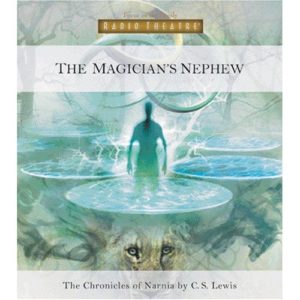 This is the sixth book of The Chronicles of Narnia (in publication order), and tells the story of the creation of Narnia and how evil first came to that land. Digory Kirke and Polly Plummer are the first two children from our world to step foot in Narnia.
This is the sixth book of The Chronicles of Narnia (in publication order), and tells the story of the creation of Narnia and how evil first came to that land. Digory Kirke and Polly Plummer are the first two children from our world to step foot in Narnia.
I love the spiritual parallels here. Because The Magician’s Nephew isn’t among my favorites of the Chronicles, I tend to not reread it very often, and so I think those parts are fresher to me. I loved the explanation of the fruit and how the Witch would always hate it because she ate it at the wrong time and without permission. It’s also noted how people justify their actions by saying that “common rules” don’t apply to them, because they are engaged in Great Things (piffle). There is a strong relation between the Deplorable Word and the atom bomb of our world … chilling. The genius of Lewis is in how he makes these ideas so simple — or rather, is able to strip away all the confusion we adults like to cloud them with.
The Focus on the Family Radio Theatre dramatization of this story is excellent. I have a few quibbles, but they are minor in light of the whole. They didn’t make it quite clear enough that Uncle Andrew couldn’t hear the animals speak. I think a lot of the comedy was lost in the description of how they tried to plant him, too. But the voice actor who played Uncle Andrew was wonderful, just as I imagined him. I also really liked the Cabby, Digory, and Polly. David Suchet’s Aslan wasn’t loud and overplayed either in this story. I think he is growing on me a bit.
Some parts of this story were very emotional for me, like when Digory withstands the temptation of the Witch about the apple and later brings an apple to his mother. The children are quite believable in their quarrels (though they never become irritating). The sound effects were excellent, and I liked the music especially during the Creation. They didn’t try to overdo it.
All in all, this is another skillful adaptation that is well-executed and entertaining. I recommend it!
The Horse and His Boy
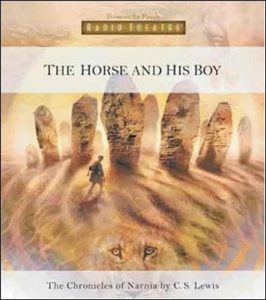 The Horse and His Boy is the fifth book in The Chronicles of Narnia (in publication order). It has always been my favorite, if one can pick a favorite among the Chronicles, and I was looking forward to hearing Focus on the Family Radio Theatre’s adaptation. It did not disappoint.
The Horse and His Boy is the fifth book in The Chronicles of Narnia (in publication order). It has always been my favorite, if one can pick a favorite among the Chronicles, and I was looking forward to hearing Focus on the Family Radio Theatre’s adaptation. It did not disappoint.
I really like the actors they chose for Shasta and Aravis. Shasta especially had a slightly breaking quality to his voice that I found pleasant. It helped to distinguish him from the other young male actors in the series. Aravis had just the right balance of youth and attitude. Bree was fantastic, and so was Hwin. The four really picked up on the subtle underlying humor of their interactions.
I do have to say I’m not a fan of some of the music in this one. The “Arabian Nights” feel is great, but the calmer guitar-picking reminds me terribly of the music from The Princess Bride. And it’s not a connection I want to make with Narnia, much as I enjoy that story!
I was disappointed when I got to the scene with the Tisroc and Rabadash and there was no Ahoshta Tarkaan! He doesn’t add much to the plot importance of the scene, of course, but the scene as originally written is one of the comic highlights of the Chronicles for me. I don’t know if they were trying to tighten the timing or what, or make sure the action wasn’t obscured by the fun, but I wish Ahoshta would have been there.
But these are probably my only quibbles. Overall, it’s a great adaptation that loses nothing of the adventure and excitement — and thrilling spiritual parallels — of the original story. For Narnia and the North!
Prince Caspian
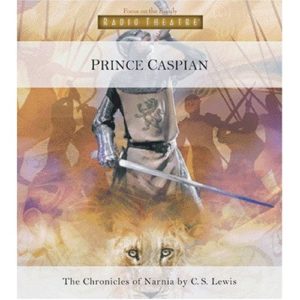 In publication order (which is the only way to read these stories!), this is the second book in The Chronicles of Narnia. I just finished the Focus on the Family dramatization of The Lion, the Witch and the Wardrobe and enjoyed it immensely, and I had high hopes for the second book, though it is not a high favorite of mine among the other books of the series. But it’s Narnia, and of course I still love it.
In publication order (which is the only way to read these stories!), this is the second book in The Chronicles of Narnia. I just finished the Focus on the Family dramatization of The Lion, the Witch and the Wardrobe and enjoyed it immensely, and I had high hopes for the second book, though it is not a high favorite of mine among the other books of the series. But it’s Narnia, and of course I still love it.
For the most part, those high hopes were fulfilled. Focus on the Family again treats us to a professional dramatization of a classic story, and the voice talents are exceptional. Many times the actor’s voice was not how I had imagined it would be, but by their second or third speech I quickly became reconciled to it by the excellence of their performances. Trumpkin was one character in particular who really grew on me. I love that they kept his brilliant, comic dialogue from the book. I laughed aloud when he shrieked in exasperation at the paw-sucking Bulgy Bear, “You’re doing it this very moment!”
David Suchet’s Aslan was again badly overplayed, but his part was brief and not as glaringly unpleasant as in The Lion, the Witch and the Wardrobe. Douglas Gresham’s introduction and closing comments were quite interesting, and I enjoy his deep rolling voice.
I did hear one very awful, very egregious mistake in the script. I believe it’s on the first disc of PC, track six, around 2:30–2:50. Caspian is talking about how his uncle Miraz killed his father, and how Miraz sent his Nurse away for telling Caspian stories of Old Narnia. But Caspian says, “My father sent her away.” My father?! I don’t know how such an awful mistake was not caught by someone in the production — at the very least, the actor playing Caspian! Did he not think through his lines at all?
Another small quibble was how, when he told the children the story, Trumpkin kept calling Miraz “King Miraz.” This struck me as very odd coming from one who was an active part of the movement against Miraz, that held that Miraz was no legal king at all, but a usurper. Why would a member of the rebellion call the enemy “King”? In Trumpkin’s eyes, that was Caspian’s title. In the book I believe they just call him Miraz.
Besides that, the script was very faithful to the original, which thrills the purist in me to no end! I enjoyed this production very much, and I can’t wait for The Voyage of the Dawn Treader. Recommended.
The Voyage of the Dawn Treader
 In the third story of The Chronicles of Narnia (third in publication order, that is), Lucy and Edmund get back to Narnia through a painting on the wall of their Aunt Alberta’s house. But this time they accidentally bring along their cousin Eustace, who is a “record stinker.” Focus on the Family Radio Theatre’s adaptation starts with the classic line of the book: “There was once a boy named Eustace Clarence Scrubb, and he almost deserved it.”
In the third story of The Chronicles of Narnia (third in publication order, that is), Lucy and Edmund get back to Narnia through a painting on the wall of their Aunt Alberta’s house. But this time they accidentally bring along their cousin Eustace, who is a “record stinker.” Focus on the Family Radio Theatre’s adaptation starts with the classic line of the book: “There was once a boy named Eustace Clarence Scrubb, and he almost deserved it.”
I think this is my favorite of the radio adaptations so far. The worst part of the first two — David Suchet’s badly overplayed Aslan — is hardly present in this story. And actually Suchet is starting to grow on me a bit. To be sure, his loud, stronger lines are rather awful. But when he is more subdued, his purring growliness is actually quite good. He didn’t have any really loud lines in this story, so there were no wincing moments for me.
I like the actor that they chose to play Eustace. His voice is higher than Edmund’s, and he was quite convincing in his peevishness. His journal entries are some of my favorite parts in the book, and I’m glad they were kept in this adaptation. Reepicheep is back, and I’m really starting to like their choice for his voice. It definitely sounds different from the humans.
The sound effects and music are again excellent, and the faithfulness to the original story is wonderful. I don’t think they put a foot wrong in this adaptation, and it has already become a favorite of mine. Highly recommended!
The Silver Chair
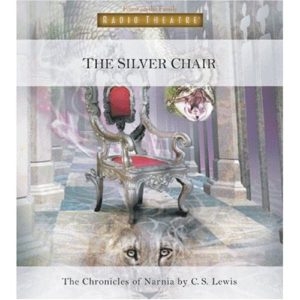 The Silver Chair is the fourth book in The Chronicles of Narnia (in publication order), and has always been near the top of my favorites among the series. I was very curious to see how Focus on the Family Radio Theatre would bring this particular story to life. For the most part, my high expectations were fulfilled, and I very much enjoyed it.
The Silver Chair is the fourth book in The Chronicles of Narnia (in publication order), and has always been near the top of my favorites among the series. I was very curious to see how Focus on the Family Radio Theatre would bring this particular story to life. For the most part, my high expectations were fulfilled, and I very much enjoyed it.
But I had a few quibbles. I expected Puddleglum’s voice to be a bit deeper and drearier somehow. Less animation, perhaps? I know he’s a comical character but his accent was a bit too goofy and over the top. These complaints improved as I got more used to his voice, but I’m still not in love with it. And Puddleglum’s rousing speech to the Lady of the Green Kirtle was slightly overplayed, I thought. Yes, it’s a wonderful moment, but something about how the audience seemed expected to get carried along made me dig in my heels.
Another thing that I found rather funny was the voice of the Giant queen. It’s so laughably masculine! It doesn’t sound even remotely feminine, even for a Giant.
I will say that the actress who plays Jill is really wonderful for the part. Eustace was great, following up his performance in The Voyage of the Dawn Treader. Aslan was also fine in this one; no booming lines to make me wince. I also rather liked the voice for Rilian.
As usual, the adaptation was splendidly faithful to the original, and Paul Scofield’s narration was excellent. I highly recommend this dramatization to anyone who enjoys The Chronicles of Narnia and fantasy in general. First-class stuff!
The Last Battle
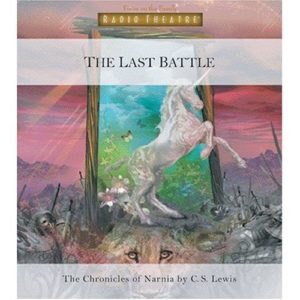 Finally Focus on the Family and I are in agreement as to what position this book should occupy in The Chronicles of Narnia series! It is seventh, of course. This story shows the end of Narnia as we know it.
Finally Focus on the Family and I are in agreement as to what position this book should occupy in The Chronicles of Narnia series! It is seventh, of course. This story shows the end of Narnia as we know it.
This story has always been my least favorite among the Chronicles because of all the ugly things that happen. The payoff at the end never really redeemed all the awfulness for me, somehow. I admit I’ve skipped it during my last several rereads, even though as a Narnia book it’s automatically excellent. And so I thought when I reached this point in the radio dramas that the best was over with. I was delighted to be wrong.
This adaptation takes up three discs, and I’m so glad they didn’t cut anything for the sake of time. The beginning feels slow, and it’s infuriating to hear how Shift mistreats Puzzle. It always angered me in the book, and it angered me to hear it. But that means Lewis succeeded, of course.
Once things start really happening, I was gripped. Everything sacred was thrown down and trampled on. When Tirian announces that “Narnia is no more,” it’s like a blow. But this audio experience somehow got through to me in a way the book hasn’t yet. Only when everything is destroyed can it be made new. The ending is worth all the ugliness of the rest of the story. The true Narnia never really dies.
The voice acting and sound effects were quite good, and this really is a top-notch production. Highly recommended.

































